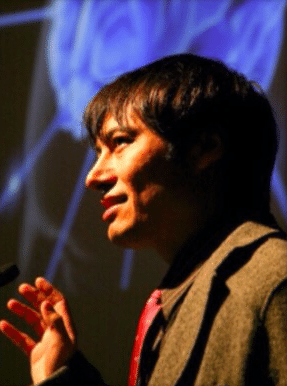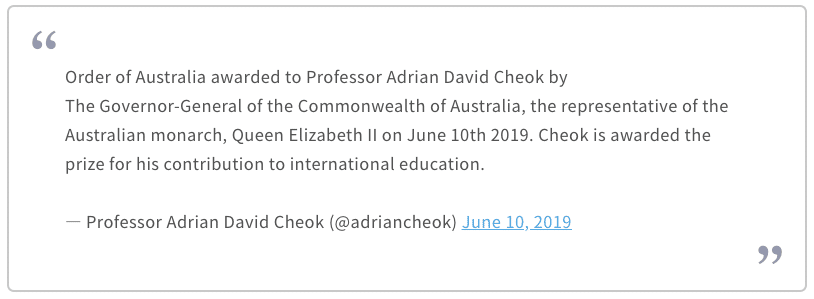
Doraemon is home! Interview with a computer professor!
This article is open to the public. Please donate to support the children in the Myanmarese refugee children's centre.
(Interview: June 2019)
What if you could make a living by flying around the world ane studying various new technologies?
This time I interviewed the computer expert Dr Adrian Cheok!
Introducing Dr Adrian Cheok
Dr Adrian David Cheok was born in 1971.

He is a university professor and a computer scientist. He was born in Australia and lived in South Australia until he graduated from college.
What do you do every day as a computer scientist?
Usually, I exchange opinions with other researchers, do research and write dissertations, or make new inventions using current technology. Since I am a university professor, I fly around the world and teach at various universities.
He received the Order of Australia award in 2019.

Why did you become a computer scientist?
I've always been curious and curious about how things work inside. Sometimes I disassembled toys that I received from a young age, and I disassembled watches. I met engineering when I was a college student, and decided that I wanted to live in the world of technology. By the way, my parents told me to be a doctor.
My goal is to connect every sense to technology. My dream is to make a world where humans coexist with emotional robots.
What do you teach?
I teach engineering, media design, software and hardware technology. I also work with students on projects using them.
I was a professor at Keio University in Japan. In Malaysia, I did experiments and research in my lab with university students from Japan, Malaysia and UK to reproduce the five senses using machines. For example, we send an electric signal from a computer to reproduce the taste of sweet, bitter, spicy, etc., or you kiss a machine, the feeling is memorized as a signal, which is sent to another device on the other side of the world. Then you can send kisses to people!
Kissenger, a device that Dr Adrian developed

Will these devices be commercialised?
Many of these gadgets are still in the experimental stage, and our current research will help us develop new ones in the next 20 or 30 years.
What do you think the world will look like in the future when your products are put to practical use?
I think a lot of artificial intelligence and robots will be used around us. Robots will blend into our daily lives and play a major role in homes and offices. We will live with robots. For example, it is ideal to have a robot take care of the sick or do housework.
But there are pros and cons to everything. It depends on what kind of relationship humans and robots have.
What are your recent challenges?
Last month (January 2019), I ran for an election in Australia. I didn't know much about politics and elections, so I worked hard and studied politics. I ran for a new party this year, established by Mr Fraser Anning. As a result, I lost, but I could meet people I wouldn't meet in my daily life. Also, when I ran for the party, some people said, "Do your best!" and supported me, but some people said, "I don't like you." So I learned to be free of others' opinions.
Do you have a motto?
Don't be afraid to try something new, chasing what interests you. As you refine your interests, money and careers will come naturally.
Special:
I heard that you are coming to teach at a university in Japan. Is this true?
I will be a professor at the "情報経営イノベーション専門職大学(short: iU)" which will open in Tokyo from April 2020. Junior and senior high school students are all very welcome to come to events before the opening of the school!
Will all the classes be in English?
Umm, I don't know yet. But I think so. Please do your best in English!
What is 情報経営イノベーション専門職大学(iU)
It is a new university that will open in Tokyo from April 2020! It mainly focuses on ICT and works on entrepreneurship, engineering and development of computer software and hardware. If you are interested, click here for the university's homepage
ここから先は
¥ 500
この記事が気に入ったらチップで応援してみませんか?
